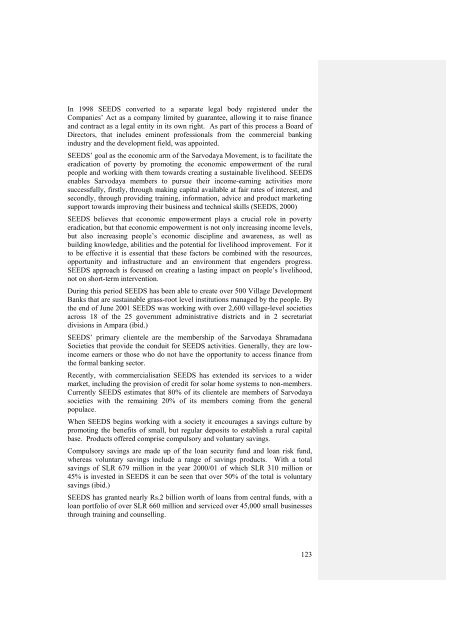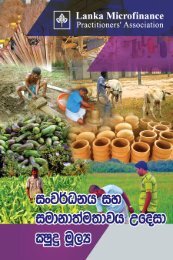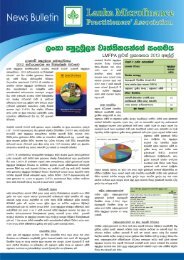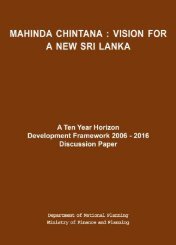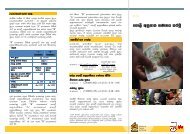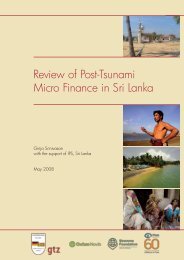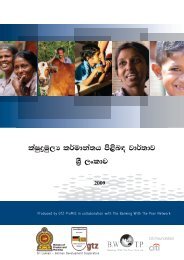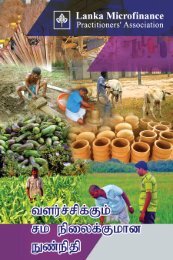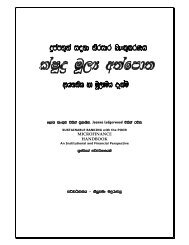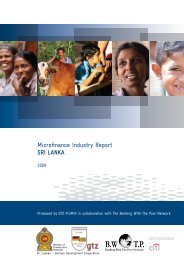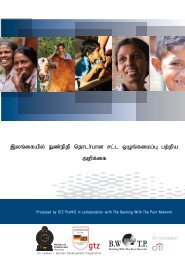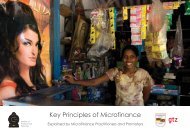National Microfinance Study of Sri Lanka: Survey of Practices and ...
National Microfinance Study of Sri Lanka: Survey of Practices and ...
National Microfinance Study of Sri Lanka: Survey of Practices and ...
Create successful ePaper yourself
Turn your PDF publications into a flip-book with our unique Google optimized e-Paper software.
In 1998 SEEDS converted to a separate legal body registered under the<br />
Companies’ Act as a company limited by guarantee, allowing it to raise finance<br />
<strong>and</strong> contract as a legal entity in its own right. As part <strong>of</strong> this process a Board <strong>of</strong><br />
Directors, that includes eminent pr<strong>of</strong>essionals from the commercial banking<br />
industry <strong>and</strong> the development field, was appointed.<br />
SEEDS’ goal as the economic arm <strong>of</strong> the Sarvodaya Movement, is to facilitate the<br />
eradication <strong>of</strong> poverty by promoting the economic empowerment <strong>of</strong> the rural<br />
people <strong>and</strong> working with them towards creating a sustainable livelihood. SEEDS<br />
enables Sarvodaya members to pursue their income-earning activities more<br />
successfully, firstly, through making capital available at fair rates <strong>of</strong> interest, <strong>and</strong><br />
secondly, through providing training, information, advice <strong>and</strong> product marketing<br />
support towards improving their business <strong>and</strong> technical skills (SEEDS, 2000)<br />
SEEDS believes that economic empowerment plays a crucial role in poverty<br />
eradication, but that economic empowerment is not only increasing income levels,<br />
but also increasing people’s economic discipline <strong>and</strong> awareness, as well as<br />
building knowledge, abilities <strong>and</strong> the potential for livelihood improvement. For it<br />
to be effective it is essential that these factors be combined with the resources,<br />
opportunity <strong>and</strong> infrastructure <strong>and</strong> an environment that engenders progress.<br />
SEEDS approach is focused on creating a lasting impact on people’s livelihood,<br />
not on short-term intervention.<br />
During this period SEEDS has been able to create over 500 Village Development<br />
Banks that are sustainable grass-root level institutions managed by the people. By<br />
the end <strong>of</strong> June 2001 SEEDS was working with over 2,600 village-level societies<br />
across 18 <strong>of</strong> the 25 government administrative districts <strong>and</strong> in 2 secretariat<br />
divisions in Ampara (ibid.)<br />
SEEDS’ primary clientele are the membership <strong>of</strong> the Sarvodaya Shramadana<br />
Societies that provide the conduit for SEEDS activities. Generally, they are lowincome<br />
earners or those who do not have the opportunity to access finance from<br />
the formal banking sector.<br />
Recently, with commercialisation SEEDS has extended its services to a wider<br />
market, including the provision <strong>of</strong> credit for solar home systems to non-members.<br />
Currently SEEDS estimates that 80% <strong>of</strong> its clientele are members <strong>of</strong> Sarvodaya<br />
societies with the remaining 20% <strong>of</strong> its members coming from the general<br />
populace.<br />
When SEEDS begins working with a society it encourages a savings culture by<br />
promoting the benefits <strong>of</strong> small, but regular deposits to establish a rural capital<br />
base. Products <strong>of</strong>fered comprise compulsory <strong>and</strong> voluntary savings.<br />
Compulsory savings are made up <strong>of</strong> the loan security fund <strong>and</strong> loan risk fund,<br />
whereas voluntary savings include a range <strong>of</strong> savings products. With a total<br />
savings <strong>of</strong> SLR 679 million in the year 2000/01 <strong>of</strong> which SLR 310 million or<br />
45% is invested in SEEDS it can be seen that over 50% <strong>of</strong> the total is voluntary<br />
savings (ibid.)<br />
SEEDS has granted nearly Rs.2 billion worth <strong>of</strong> loans from central funds, with a<br />
loan portfolio <strong>of</strong> over SLR 660 million <strong>and</strong> serviced over 45,000 small businesses<br />
through training <strong>and</strong> counselling.<br />
123


